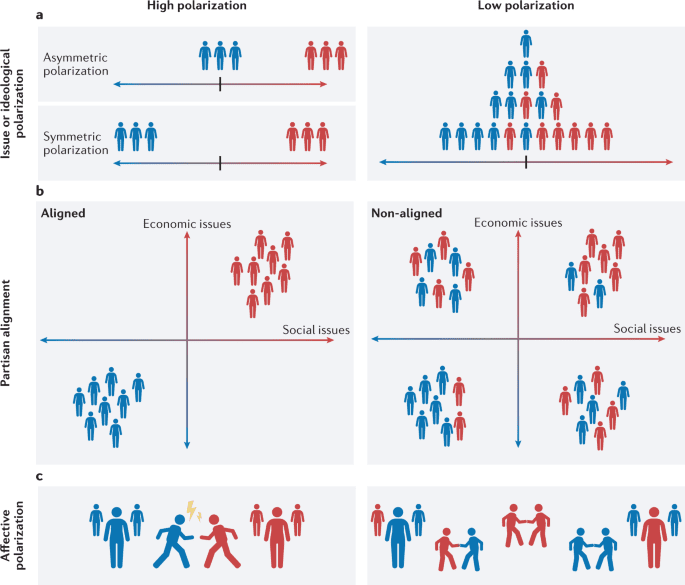Political polarization is a growing phenomenon in western democracies, where people become more ideologically extreme, leading to a widening gap between opposing political views. This article outlines ten negative consequences of such polarization. It can result in political instability, reduced trust in institutions, increased hate crimes and discrimination, violence and civil unrest, undermining national unity, increased uncivil discourse, inaccurate and biased information, economic inequality, challenges to governance, and negative impacts on mental health. Addressing political polarization is vital to finding common ground and promoting greater unity in societies.
The Consequences of Political Polarization
Political polarization is the process through which people become more ideologically extreme, creating a widening gap between opposing political views. This phenomenon has become increasingly prominent in recent years, particularly in western democracies. The following are ten consequences of political polarization that have the potential to negatively impact societies.
1. Increased Political Instability
With each side becoming more extreme, the likelihood of compromise and collaboration decreases. This can lead to political gridlock and instability, particularly in systems where two major parties are involved. As a result, governments may struggle to pass important legislation and address pressing issues, causing dissatisfaction and unrest among citizens.
2. Reduced Trust in Institutions
Political polarization can erode people’s trust in public institutions, such as the media, government, and even the judiciary. Members of each side may dismiss or question the legitimacy of institutions that do not align with their beliefs, resulting in institutional paralysis and a loss of confidence in the ability of officials to govern effectively.
3. Increased Hate Crimes and Discrimination
Partisan polarization has the potential to lead to a rise in hate crimes and discrimination. When people are encouraged to view those with opposing political views as enemies, it can fuel the development of extremist groups and even violent acts against those who do not share their beliefs.
4. Violence and Civil Unrest
Polarization can create an atmosphere of hostility and tension, making it easier for civil unrest and even violence to erupt. When political parties, social groups, or media outlets discuss issues in zero-sum terms, it can create an “us vs. them” mentality that can feed into these negative outcomes.
5. Undermining National Unity
Extreme political polarization can also have a corrosive impact on national unity. Countries become more divided along political lines and the sense of national identity may be undermined, causing disunity and potential conflict.
6. Increased Uncivil Discourse
Polarization can also lead to an increase in negative, uncivil, and unproductive discourse. This happens when individuals and groups attack each other’s character instead of engaging in constructive dialogue around issues. Social media makes this especially easy, as people can hide behind anonymity and behave in ways they wouldn’t typically do face-to-face.
7. Inaccurate and Biased Information
Partisan media outlets and social media sites can provide inaccurate and biased information that reinforces the view of the world held by those on each side of the ideological divide. This can lead to the spread of misinformation and conspiracy theories, further polarizing people and making it more difficult to engage in reasoned, evidence-based discussions.
8. Economic Inequality
Polarization may amplify income inequality and lead to policies that favor certain interest groups at the expense of others. The concentration of wealth and power within a small group of elites can also undermine the functioning of democratic institutions.
9. Challenges to Governance
Polarization can make it increasingly difficult for governments to create effective policies, respond to economic challenges or natural disasters, and address multiple issues simultaneously. Because the focus is on political ideology rather than practical solutions, this can lead to delays in addressing urgent problems.
10. Negative Impact on Mental Health
Lastly, political polarization can have negative impacts on mental health. Individuals who perceive their political group as being superior to others may experience heightened anxiety, hostility, and stress when interacting with people from opposing groups. This can also lead to a form of identity crisis, where people feel lost and confused about their place in society.
In conclusion, political polarization can have far-reaching consequences for societies, governments, and individuals. The development of ideologies that are not open to opposing viewpoints can further the divisions in a society, leading to further tension. Acknowledging the existence of polarization is the first step in working to find common ground and foster greater unity.
